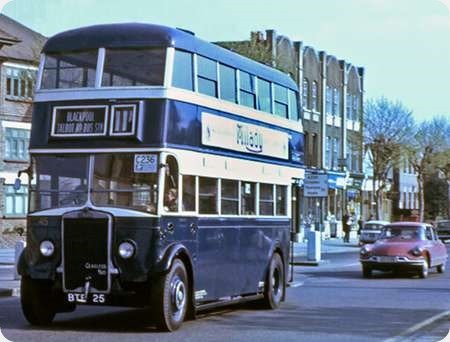Lytham St Annes Corporation – Leyland Titan TD – BTF 25 – 45
Lytham St Annes Corporation
1937
Leyland Titan TD4c
Leyland FH30/24R
The Leyland Titan TD4 replaced the TD3 in production from 1935, differing from its predecessor fundamentally only in the replacement of the three servo vacuum braking system by vacuum/hydraulic operation. The Lysholm Smith torque converter, designed in 1928, was quite popular in the TD3c ‘Gearless Bus’ chassis, the ‘c’ suffix denoting the converter, and remained a transmission option for the TD4. In 1935 Lytham St Annes Corporation took three Leyland Lion LT7c vehicles with torque converters, and all the 1936/37 deliveries, totalling 22 buses, of Lions and Titans, had the converter transmission. These, however, were the last torque converter buses to be received by Lytham St Annes. BTF 25, No. 45, is a Leyland Titan TD4c delivered in March 1937 with a Leyland full fronted FH30/24R body. Unlike the full fronted centre entrance Titans in the fleet of its near neighbour to the north, Blackpool, the Lytham St Annes buses had exposed radiators and rear entrances. In later years some were converted to open top, but number 45 survived intact into preservation. It is pictured at South Croydon on its way to Brighton during the May 1972 HCVC Rally. It is currently undergoing extensive restoration. This is one of only two surviving ’Gearless Buses’, the other being BTB 928, Lytham St Annes No. 34, a 1936 Leyland Lion LT7c.
Photograph and Copy contributed by Roger Cox
13/04/22 – 08:07
Interesting post, Roger. I imagine that the sudden burst of interest in buying Leyland Gearless buses was the closure of their tramway system between 1936 and 1937, thereby easing the tram drivers’ transfer to buses. Many a municipal transport entity did this, but Portsmouth Corporation was late in doing so, buying Crossleys so fitted post-war, when the trams had gone in 1937! They so liked them, that they were converted with Leyland TD4 engines and gearboxes late in their lives! The Crossleys had, if memory serves, Brockhouse converters, which involved the engines rising to their governors to pull away and accelerate and coasting along to the next bus stop!
Chris Hebbron
13/04/22 – 12:58
As you say, Chris, all of Portsmouth’s 31 post-war Crossleys had turbo-transmitters from new, until the late 1950’s when the engines and transmissions from withdrawn TD4s were substituted. Interestingly, though, only two of Portsmouth’s 46 pre-war Leyland TD4s were delivered with torque convertors, both new in 1935. Therese were Nos 126 [EEC body] and 130 [Leyland vee-front body]. Both had this transmission replaced with normal gearbox transmission in 1947. It’s possible Leyland had a replacement programme in place at about that time, as I have read of various municipalities and companies who replaced torque convertor transmission with standard gearbox in the period 1946-47.
Michael Hampton
14/04/22 – 08:17
You have to wonder why they converted 126 and 130 from turbo converters to normal gearboxes in 1947, then purchased a whole batch of Crossleys with turbo converters in 1948/49. Was it around that time that there was a change of General Manager, a thought in the back of my head?
Chris Hebbron
16/04/22 – 08:05
Chris Hebbron mentions the change of Manager at Lytham.
Here are the dates
J.C. Fairchild 1929 – 1946
W. Ashton 1946 – 1954
I hope that helps?
Stephen Howarth
19/04/22 – 06:16
There was no change of Portsmouth manager until 1951, when H C Simmonds took over from Ben Hall. Mr Hall had been manager for many years, and would have been in charge of the ordering of all the pre-war Leyland Titans, and the post-war Leylands and Crossleys. He would also have dealt with the replacement transmissions of the TD4c’s 126/130.
Mr Hall was very pleased with the pre-war Crossley Condors, and I have seen a photo of a visit made by a Crossley rep to Portsmouth c.1945 to receive his congratulations on the lengthy service of these diesel-engined vehicles. Perhaps the reputation and sales pitch was sufficient for the post-war order to be placed. After all, Crossley’s war-time demonstrator had been well received in several places [although it’s not recorded to have visited Portsmouth], and it was only later that the Crossley company messed things up by not proceeding with the patent rights on the engine design.
Michael Hampton
Quick links to the - Comments Page - Contact Page - Home Page
Comments - Please note: The comments facility is not currently available. Please see the home page for updates.
Please Note if you want to send a photograph with your comment please use the Contact Page by clicking here or send as an attachment via email.

